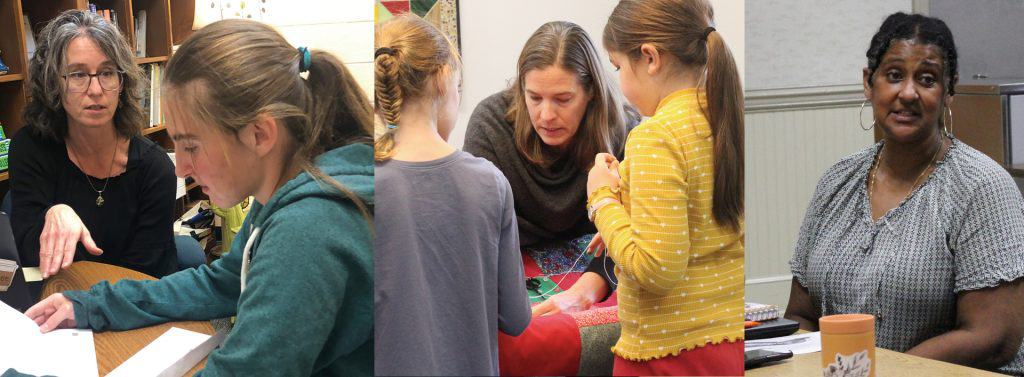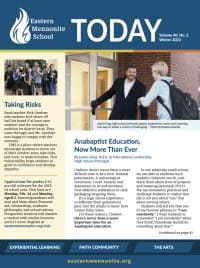Each of our 380+ students are known by at least one EMS professional counselor, as well as their principal, and teachers. Counselors have open doors and are visible throughout the day.
Q: What is the primary way you interact with students?
Jodi: I meet with each class group at least once a year to talk about the college application process, and schedule individual meetings with each junior and senior (seniors with a parent/guardian). I host a college application workshop before school each fall for seniors. Students know they can drop by my office anytime and often pop in to ask a quick question or schedule a longer meeting to work on an essay or application. I also respond to many emailed questions and requests for essay feedback from seniors.
Debbie: Face-to-face conversation. Mostly I meet with students individually or with a group in my office. Sometimes we go outside and sit or take a walk. I’ve met with students in the gym and talked while shooting hoops. With parent permission, I’ve met with students at a coffee or bagel shop since they didn’t feel comfortable meeting on campus. And some prefer to talk through email exchanges.
Gini: My student interactions vary across the age span. Play is an important part of a student’s communication process in younger years. This takes many forms (individually or in small groups) with games, art, stories, puppets, sand tray, gardening,
etc. As students approach middle school, interactions lean more toward processing through talk and sometimes include art or movement.
Q: What do you see our students struggling with?
Jodi: Many students feel pressured to make decisions they aren’t ready for, or to attend colleges that have a certain level
of perceived prestige, even if those colleges might not be the best fit for them. It’s even more difficult for students who don’t want to attend college, but feel that option is looked down on. The college admissions landscape is much more fraught now than it was when I was a student, and it’s easy for students to think they have to do everything – to have perfect grades in highly demanding classes while participating in a variety of extracurricular activities and leadership positions… and then to complete long, detailed college applications with multiple essays. I do my best to encourage a healthy balance and help them discern the path that is the right fit for them, but it’s still quite stressful.
Debbie: Some students struggle academically. I enjoy partnering with them, trying different ways to support, encourage, and explore the root of the issues for why a certain class or school in general may be difficult. Anxiety, depression, friendships, dating and breakups are other areas where some students struggle. Some are wrestling with their identity and trying to figure out their relevance in this world. Feeling conflicted about their future prospects and how to communicate that stress to parents/guardians is common, as well as fearing failure or not meeting expectations (their own and family). I also have the privilege of being invited into faith discussions and prayer times with students.
Gini: The worry brain is one of the most common challenges that I see our students face, showing itself in different ways. In addition, students are often searching for ways to resolve conflicts, build healthy relationships, or prepare for the future. I’m here to support students with whatever unique social, emotional, and academic needs they present.
Q: What makes you proud of our students?
Jodi: I just love our students. As a whole, they display such a remarkable good will toward one another, and for the most part they are able to appreciate the unique qualities each individual possesses. Because of this, students generally feel free to express themselves genuinely. Even our most academically ambitious students tend to be collaborative rather than competitive. I also think that our students are quite good at advocating for themselves and building positive relationships with their teachers and staff members.
Debbie: There are so many ways that I can express how proud I am of our students. From their hard work in the classroom, but also outside school time through sports, theater arts, robotics, Model UN, etc, I am proud of our students’ ability to verbalize their struggles and seek out solutions. Our students support each other and pay attention to when their friends are going through a difficult time. Many times students have encouraged friends to find me as a support. Our students take disclosures of self-harm and thoughts of suicide seriously and readily let me know of those concerns.
Gini: I appreciate the thoughtful way students relate to one another in ways that can both challenge and show dignity and respect for each other. EMS students put feet to their faith as they look for ways to meet the needs they see and show leadership in the process of making things right in our world.
Q: What can EMS uniquely offer students?
Jodi: I have the privilege of reading the letters of recommendation our teachers write; those letters make it clear that each student here has at least one close relationship with an adult in the building.
Our students are known and they are valued for their unique gifts. EMS offers the opportunity for students to explore a huge variety of activities and to take leadership roles in those areas. The level of trust and opportunity afforded to them is impressive.
And finally, just the fact that EMS has invested in a half-time college counseling position is rare.


